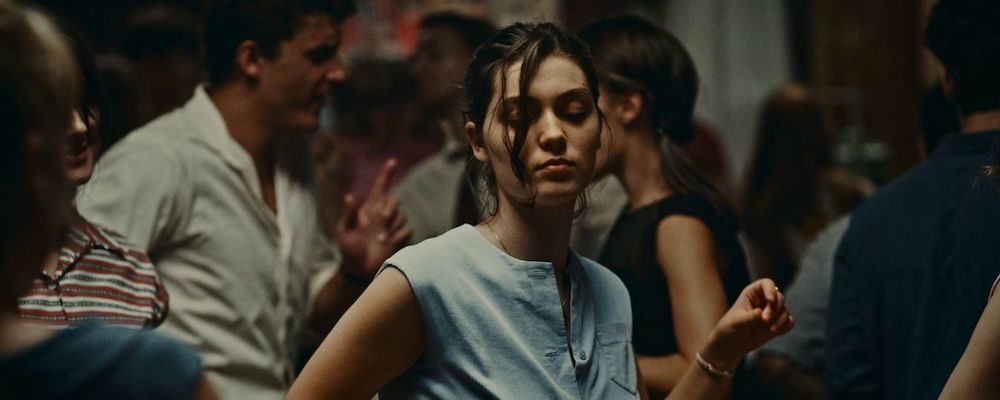‘Happening’: French Abortion Drama Harrowingly Makes a Case for Freedom of Choice
Alci Rengifo
Even if the disturbing development of the Supreme Court’s desire to overturn of Roe v. Wade had not taken place, Audrey Diwan’s “Happening” would remain a compelling, urgent film. It says something that a French director has made a movie in her country that speaks more clearly on the subject of abortion than anything produced recently in the United States. Diwan asks us to observe without judgment the journey of a young woman inhabiting a moment in time where she has few choices regarding her body. In this country we tend to argue the topic as a liberal versus conservative clash, and on a political level maybe it is. This film doesn’t spend too much time arguing politics. Diwan prefers to use cinema in one of its most potent forms, by putting us in the shoes of someone else.
That someone is Anne Duchesne (Anamaria Vartolomei), a student in 1963 northern France. She studies literature with a natural sense for poetry that inspires her professor to claim she is a natural teacher in the making. The counterculture has still not exploded and so student life on campus and in the dorms is strictly prudish. While youthful hormones bounce around everywhere, you’re not supposed to acknowledge it. No one is surprised if a female student drops out to marry a proper mate. Then Anne begins to feel different and goes to the doctor, where she learns she is pregnant. Now the choices she faces are all too stark. She can see the pregnancy through to term and risk her academic future, or seek a backstreet, illegal abortion which can result in death or prison. Friends are of little help so most are conditioned to strictly abiding by the laws.
Diwan and Marcia Romano have based the screenplay on a novel by Annie Ernaux, which is apparently autobiographical. That comes as no surprise since the details and individuals feel more real than any fiction. Diwan, herself, was once a journalist, and it shows in how she is genuinely interested in being an empathetic observer. History is now enhancing the film’s effect because suddenly Anne’s plight in 1963 doesn’t feel like the past. This film should be screened as preparation for what to expect if reproductive rights are fully taken away in this country. Anne sits near her friends and hears them shudder at the idea of becoming pregnant. Later, they will also look terrified and shocked at any talk of abortion. Sex is both natural and dangerous in this society. A member of the group shows the other girls how to find satisfaction by masturbating atop a pillow, then confesses that while she dreams of doing more with the guys she meets, she stops herself out of fear of social shame.
By using a stark visual style emphasizing a lot of hand-held camera work, Diwan makes us feel Anne’s private tortures. She wants to terminate the pregnancy but has nowhere to go. A doctor seems to show sympathy but he refuses to risk his career. Talk of abortion is whispered, like dissidents in some dystopia. The air is Kafkaesque. Another doctor takes advantage of Anne’s ignorance and prescribes medication that will strengthen the embryo without telling her. A male friend pretends to be in the know then tries to get sex out of Anne. Eventually, Anne will also attempt the abortion herself, using infamous techniques from the time, filmed by Diwan with such frankness that for some audience members the tension will be too much. Emotionally, the film can prove to be more wrenching due to how Anne bears her cross nearly alone, without confiding even in her very loving mother. Her family boasts about her academic performance and future, aloof to a private hell. Inter-titles work like a countdown, marking every passing week of Anne’s pregnancy.
Films like “Happening” are rare in their sincere depiction of a human experience. Audrey Diwan, and Anamaria Vartolomei, who delivers a performance of controlled urgency, never turn Anne into a cliché “heroine.” She’s not meant to be a wronged saint or rabble rouser. This is a normal college student like countless other ones around the world. No speeches or bold statements are inserted into the character. Instead, she is a portrait of a regular individual feeling the walls closing in. By taking such an observant tone, Diwan practices a very keen form of empathy. You as the viewer may have your own opinion on how Anne should deal with her pregnancy. The point is that she does not have a choice and her opinion on the matter is against the law. This is the best film on this subject since Tony Kaye’s searing 2007 documentary “Lake of Fire,” which crosses back and forth between the warring sides in the abortion debate.
Now developments in the United States have made it even harder to be neutral. “Happening” forces us to wonder if being neutral on this issue is even possible when a young woman is clearly risking her own life because the conservative order has control over her body. When Anne finally tells her friends about what is happening, the first issue that comes up is prison. Drama like this can issue potent warnings with foresight simply through a vivid story. Diwan’s film is set in 1963 but feels like it could be tomorrow. Our country will soon be full of many Annes, denied autonomy and choice. As a film this is well-crafted art but take others to watch it for what the story has to say. A glimpse to the past suddenly becomes a glance at the future.
“Happening” releases May 6 in select theaters.

